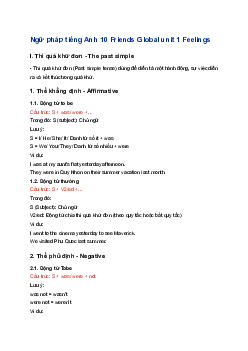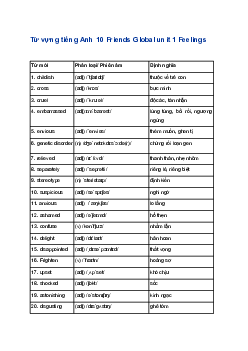






Preview text:
Giải Unit 1 Lớp 10: IB Grammar trang 12 Bài 1
Is there a lottery in your country? Do you think it is a good idea to
buy tickets? Why?/ Why not?
(Ở đất nước của bạn có bán vé số không? Bạn có nghĩ mua vé số là một
điều tốt? Tại sao? Tại sao không?) Gợi ý đáp án Cách 1
There are lots of lotteries in my country. I remembered that each province
has their own lottery and two national lottery. In my opinion, buying
lotteries ticket is just a waste of money as you can only win lottery by your luckiness. Cách 2
Is there any lottery in your country?
→ There are many lotteries in my country.
Do you think it is a good idea to buy tickets?
→ I think it is not good to buy tickets. Why? Why not?
→ Because it is just a game of chance. Dịch nghĩa
Ở nước bạn có vé số không?
→ Có rất nhiều vé số ở đất nước tôi.
Em nghĩ mua vé số có tốt không?
→ Tôi nghĩ mua vé số không tốt. Tại sao / Tại sao không?
→. Vì đó chỉ là trò may rủi. Bài 2
Read the text. Are all lottery winners happy?
(Đọc đoạn văn trên. Có phải tất cả những người thắng xổ số đều hạnh phúc không?)
Last weekend, somebody bought a lottery ticket, chose all the correct
numbers and won millions. How lucky! Or maybe not. In the 1970s,
scientists at the University of Illinois studied lottery winners and
compared their levels of happiness with other people. The results were
interesting. The winners felt delighted for a short time, but after that, their
happiness returned to normal levels. A similar study by the University of
California in 2008 gave the same results. They looked at lottery winners
six months after their win and found completely normal levels of
happiness. And for a few unlucky people, a huge lottery win was the start
of major problems. Alex Toth, for example, won $13 million in 1990. He
stopped working, spent the money quickly and had terrible arguments with his family and friends. Gợi ý đáp án
People are not always happy when they win the lottery. People can make
bad decisions or have terrible arguments with family and friends.
(Không phải lúc nào mọi người cũng vui khi thắng xổ số. Người ta có thể
đưa ra những quyết định sai lầm và và có những cuộc cãi vã tệ hại với
gia đình và bạn bè.) Bài 3
Read the Learn this! box. Find all the past simple forms in the text in
exercise 2. Match them with rules a-d in the Learn this! box.
(Đọc hộp Learn this!. Tìm tất cả các thể quá khứ trong bài đọc ở bài 2.
Nối chúng với các quy tắc trong hộp.)
LEARN THIS! Past simple (affirmative)
(Thì quá khứ đơn - dạng khẳng định)
a. We form the past simple form of regular verbs by adding -ed to the infinitive.
(Ta hình thành thể quá khứ đơn của động từ thường bằng cách thêm -ed
vào động từ nguyên mẫu.)
want – wanted talk – talked
b. There are some rules about spelling changes.
(Có một vài quy tắc về việc thay đổi chính tả khi thêm -ed.)
1. drop – dropped; 2. marry – married; 3. move – moved
c. Some verbs have irregular past simple forms.
(Một số động từ có bất quy tắc ở thể quá khứ đơn.)
go – went; begin – began; leave – left; take – took
d. The past simple of the verb be has two forms, singular and plural.
(Thể quá khứ đơn của động từ tobe có 2 dạng, số ít và số nhiều.) be – was/were Gợi ý đáp án a. returned, looked
b. studied, compared, stopped
c. bought, chose, won, felt, gave, found, spent, had d. were, was Bài 4
Complete the text with the past simple form of the verbs in brackets. Then listen and check.
(Hoàn thành đoạn văn với hình thức quá khứ đơn của động từ trong
ngoặc. Sau đó nghe và kiểm tra.)
In 2002, nineteen-year-old British refuse collector Michael Carroll and
his family (1) ______ (be) delighted when he (2) ______ (win) £9.7
million in the lottery. He (3) _____ (give) millions of pounds to charity
and to friends and relatives. He also (4) _____ (spend) thousands on loud,
all-night parties, and over the next few years, he (5) _____ (get) into
trouble with the police several times. His wife Sandra (6) ______ (be) cross and
upset and (7) _____ (decide) to leave. Soon, he (8) _____ (have) no
money left, and in 2010, he (9) _____ (begin) work as a refuse collector
again. ‘I’m just glad it's over,’ he (10) _____ (say). Gợi ý đáp án 1. were 2. won 3. gave 4. spent 5. got 6. was 7. decided 8. had 9. began 10. said Bài 5
Complete the sentences with the adjectives below and the past simple
form of the verbs in brackets.
(Hoàn thành các câu bên dưới với các tính từ bên dưới và hình thức quá
khứ đơn của các động từ bên dưới.)
bored delighted embarrassed suspicious upset
1. Sandra Carroll felt (feel) upset when Michael spent (spend) all his money on parties.
2. Spencer _____ (be) _____ when he _____ (drop) all his money on the floor of the shop.
3. Bess _____ (be) _____ when she ____ (win) the essay competition.
4. I _____ (feel) a bit _____ when the man ____ (say) he was a millionaire.
5. I _____ (get) a bit _____ because Dan _____ (talk) about his new girlfriend all evening. Gợi ý đáp án 1. felt, 2. was, 3. was; 4. felt; 5. got; upset, embarrassed, delighted; suspicious; bored; spent dropped won said talked Bài 6
SPEAKING Tell your partner about a time when you had these
feelings. Use the past simple.
(Kể với người kế bên bạn về một khoảnh khắc mà bạn có những cảm xúc
bên dưới. Sử dụng thì quá khứ đơn.) 1. anxious (lo lắng)
2. confused (bối rối)
3. cross (tức giận)
4. excited (hào hứng)
5. shocked (bất ngờ)
6. upset (buồn, không vui)
I was anxious because I had a music exam.
(Tôi lo lắng vì tôi có bài thi âm nhạc.) Gợi ý đáp án
1. I felt anxious when I had an exam.
(Tôi thấy lo lắng khi tôi có bài kiểm tra.)
2. I felt confused when I came across an old friend of mine.
(Tôi thấy bối rối khi vô tình gặp lại người bạn cũ.)
3. I felt cross when my father played the music too loud.
(Tôi thấy bực bội khi bố tôi mở nhạc quá to.)
4. I felt excited when I went to Da Lat with my best friend.
(Tôi thấy hào hứng khi đi Đà Lạt với bạn thân.)
5. I felt shocked when my best friend broke up with her boyfriend.
(Tôi bang khi nghe bạn thân chia tay với bạn trai.)
6. I felt upset when my family had a quarrel.
(Tôi thấy đau khổ khi gia đình tôi cãi vã.)




